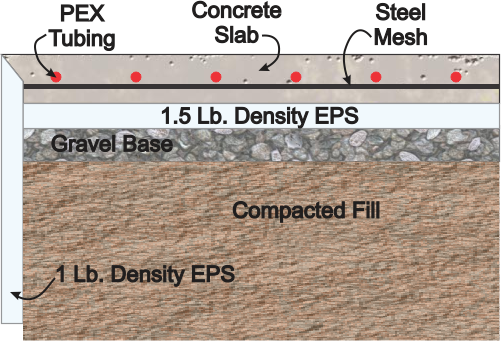We supply EPS insulation for custom home builders that install radiant floor heating systems. There are a few variables to consider when specifying the thickness and density of the EPS for radiant heat systems that are installed in concrete that is set on grade.
First, You will need to consider the live load that the finished floor will experience. For a normal residence, a 1.5 lb. density is more than adequate. For a garage with heavy vehicles, you should consider a 2 lb. density. The 2.5 lb and 3 lb. densities is typically specified for commercial road projects.
Second, you need to understand the purpose of the insulation that is installed under the concrete. If your system is designed correctly, the primary function of the rigid insulation is to reflect the heat upwards into the building. Although the EPS provides thermal protection from the cold ground, this is not its primary purpose. The ground beneath the concrete slab should be insulated by virtue of rigid EPS insulation installed on the exterior of the foundation or around the perimeter of the slab. The diagram below is an example of the latter.

The frost line of your soils will determine the depth and thickness of the vertical insulation around the perimeter of the concrete slab. You can use either a 1 lb. density or recycled EPS for the vertical insulation. Anything heavier is a waste of money. Give us a call if you want to talk about your project.
